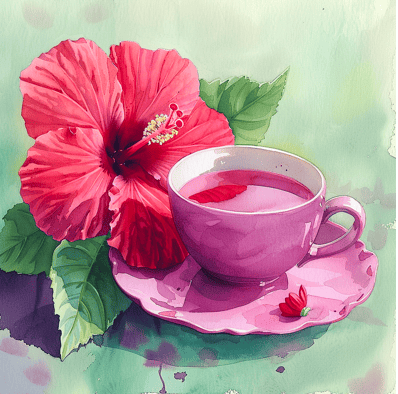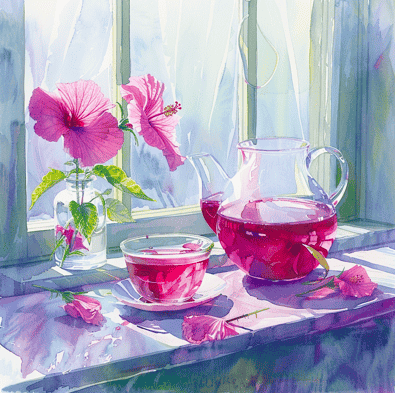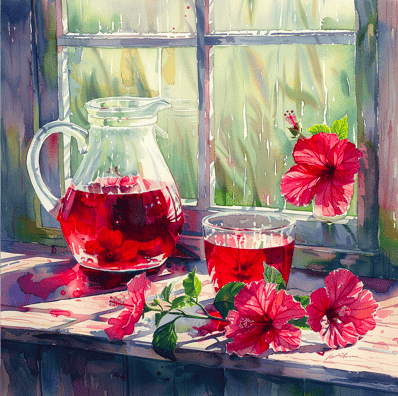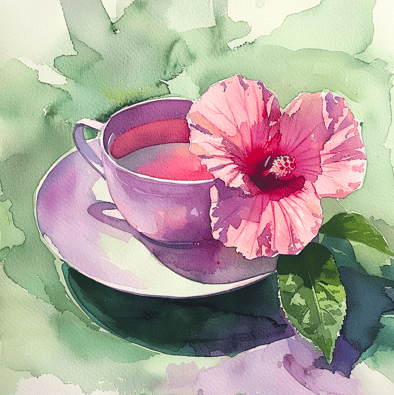
Struggling with dull skin and thinning hair? We understand the frustration of trying countless products with little success. What if a simple tea could help? Discover the potential hibiscus benefits for skin and hair that may rejuvenate your complexion and promote healthy hair growth. This post will guide you on how hibiscus tea can be a valuable addition to your beauty routine.
Hi, I’m Hazel
I gave up on skincare after years of issues with acne and sensitive skin.
But after going plant-based, my skin cleared up and even started to glow. Now I help women reveal their natural beauty with simple, delicious plant-based food.
I also used to be a nurse, and love nerding out on nutritional science (high-quality science, that is).

As usual, this post is based on the strongest nutritional evidence I could find with a focus on the simplest, most delicious foods
…because who has time to waste on actions that don’t work?
The quick version:
Struggling with dull skin and thinning hair? Hibiscus tea provides antioxidants, reduces inflammation, and supports hair follicles to help you glow naturally. Drink up to four cups a day, but if you take blood pressure medications, check in with your doctor first.

The benefits of drinking hibiscus tea
Glow from Within
Drinking hibiscus tea regularly may provide many benefits of hibiscus for your skin. It’s rich in powerful antioxidants that could fight free radical damage, potentially slowing down the aging process. This may help reduce fine lines and keep your skin looking youthful.
I love how the deep pink hue of the tea indicates the very high level of antioxidants in the tea, even more so than green tea!
Clear and Smooth Skin
Hibiscus tea has anti-inflammatory properties that may help soothe skin irritation. It also contains organic acids, like alpha-hydroxy acids and magic acid, which could aid in detoxifying your body. This might lead to clearer skin and fewer breakouts.

Healthy, Shiny Hair
The essential nutrients in hibiscus flowers, like vitamin C and amino acids, may promote healthy hair growth. Drinking hibiscus tea could improve hair health by enhancing blood circulation to the scalp, supporting hair follicles.
You may also like:
Hibiscus vs green tea: Which is better for beauty?
Topical treats: Using hibiscus tea like skincare
Natural Exfoliation – Hibiscus contains natural alpha-hydroxy acids (AHAs) that gently exfoliate, removing dead skin cells and revealing smoother skin. This may improve uneven skin tone and make your complexion glow.
Acne-Fighting Power – Using hibiscus extract topically can help clear up acne. Its antibacterial and anti-inflammatory properties may reduce redness and prevent breakouts. The astringent properties of hibiscus may also help to shrink pores and tighten skin.

Firm and Youthful Skin – Hibiscus may boost collagen production and connective tissue health with its antioxidants. Collagen production improves skin elasticity and reduces the appearance of fine lines. Its natural saponins and vitamin C content help protect against UV rays and oxidative stress.
Hair Growth and Shine – Applying hibiscus hair oil might strengthen the hair roots and promote hair regrowth. This could reduce hair fall and dandruff, leaving your hair shiny and healthy. Hibiscus is especially beneficial for treating frizzy hair and itchy scalp.
Want to create your own routine?
For optimal hibiscus benefits for skin and hair, drinking hibiscus tea at specific times can enhance its effectiveness:
Morning
Drinking hibiscus tea in the morning can kickstart your day with a boost of antioxidants. This can help protect your skin from free radicals throughout the day and promote healthy blood circulation, which is beneficial for both skin and hair health.
I personally can feel a bit light-headed after drinking a deep pink hibiscus tea in the morning, so I avoid this tea until the evening. You might find you have to experiment for the best routine for yourself too.
Afternoon
A cup of hibiscus tea in the afternoon can be refreshing and help maintain your body’s hydration. Staying hydrated is key for healthy skin and hair. The tea’s anti-inflammatory properties can also help soothe any midday skin irritation.

Evening
Consuming hibiscus tea in the evening may help your body detoxify overnight. This can be beneficial for skin clarity and reducing breakouts. Additionally, the nutrients in the tea can continue to support hair follicles and promote hair growthas you rest.
You’ll also love:
Is Hibiscus Tea Safe Every Day? Find Out!
Final Tip
Incorporating hibiscus tea into your daily routine, spread out over the day, may provide continuous support for your skin and hair. Enjoy it hot or cold, depending on your preference, and consider adding a touch of honey for added benefits.
Important Warning
Hibiscus tea can lower blood pressure. If you have low blood pressure or are taking medication for high blood pressure, consult your doctor before drinking hibiscus tea. Also, avoid consuming more than four cups or one quart a day due to its high manganese content.
Hibiscus benefits for skin and hair
Incorporating hibiscus tea into your daily routine can offer numerous potential hibiscus benefits for skin and hair. Drinking this antioxidant-rich herbal tea may help promote a youthful complexion, clearer skin, and healthier hair. Remember to enjoy hibiscus tea in moderation, and consult with your doctor if you have concerns about its effects on your blood pressure. Embrace the natural goodness of hibiscus and sip your way to beauty!

FAQ: Hibiscus benefits for skin and hair
Is hibiscus good for the face?
Drinking hibiscus tea may benefit your face. It contains alpha-hydroxy acids (AHAs) that could help with cell turnover, making your skin look fresh and youthful. The hibiscus extract has anti-inflammatory properties that may soothe sensitive skin and reduce skin irritation. It also fights free radicals, which might help prevent collagen degradation and reduce wrinkles.
How to use hibiscus for hair growth?
Drinking hibiscus tea might promote hair growth. The tea contains essential nutrients like vitamin C and amino acids that could support hair follicles and improve hair health. While hibiscus tea may help reduce hair fall, it is not a guaranteed solution.
How do you use hibiscus for skin tightening?
Consuming hibiscus tea might help with skin tightening by boosting collagen production. The natural alpha-hydroxy acids and astringent properties in hibiscus may improve skin elasticity over time. However, results can vary from person to person.
How do you use hibiscus to whiten your skin?
Drinking hibiscus tea might help brighten your skin due to its natural ingredients that can improve skin tone. The tea’s antioxidant properties may reduce dark spots and promote a more even skin tone, but it’s not a strong skin whitener.
Does hibiscus turn white hair to black?
Drinking hibiscus tea may help slow down the process of premature greying of hair, but it doesn’t turn white hair black. Regular consumption might improve overall hair health and potentially darken hair slightly, but it’s not a permanent solution for white hair.
Does hibiscus remove dark spots?
Hibiscus tea may help reduce dark spots. Its alpha-hydroxy acids might exfoliate the skin from within, promoting the growth of new, healthy skin cells. Regular consumption can be part of a consistent skin care routine, but results may vary.
Does hibiscus reduce grey hair?
Drinking hibiscus tea might help reduce the appearance of grey hair and slow down the greying process. The tea’s nutrients could strengthen hair roots and support hair regrowth, but it won’t eliminate grey hair completely.
Does hibiscus reduce wrinkles?
Yes, hibiscus tea may help reduce wrinkles. It might boost collagen production and fight free radicals. The vitamin C and natural saponins in hibiscus could protect against UV rays and oxidative stress, helping to maintain your skin’s youthful appearance and elasticity. Regular consumption might lead to smoother skin over time.
References
Most references below will link to the original peer-reviewed study itself. However, sometimes I will link to a video over at NutritionFacts.org instead, which is by far the single best resource of brutally transparent nutritional evidence you will ever see. Dr Greger tells a great story about the realities of the science and if I think you will benefit more from one of his videos, the link will take you there instead.
Happy nerding!
- Carlsen MH, Halvorsen BL, Holte K, et al. The total antioxidant content of more than 3100 foods, beverages, spices, herbs and supplements used worldwide. Nutr J. 2010;9:3. Published 2010 Jan 22. doi:10.1186/1475-2891-9-3
- Riaz G, Chopra R. A review on phytochemistry and therapeutic uses of Hibiscus sabdariffa L. Biomed Pharmacother. 2018;102:575-586. doi:10.1016/j.biopha.2018.03.023
- Ismanto, S.D., Anggraini, T. and Fitri J.NST, M. (2015). The Influences of Lime Powder (Citrus aurantifolia, S. ) on Hibiscus Leaf Tea Quality (Hibiscus rosasinensis, L.). International Journal on Advanced Science, Engineering and Information Technology, 5(6), p.488. doi:https://doi.org/10.18517/ijaseit.5.6.598.
- Izquierdo-Vega JA, Arteaga-Badillo DA, Sánchez-Gutiérrez M, et al. Organic Acids from Roselle (Hibiscus sabdariffa L.)-A Brief Review of Its Pharmacological Effects. Biomedicines. 2020;8(5):100. Published 2020 Apr 28. doi:10.3390/biomedicines8050100
- Video: Hibiscus Tea for Hypertension at NutritionFacts.org